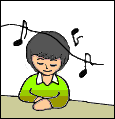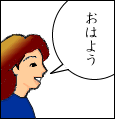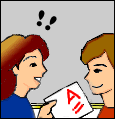Group Session for Lesson 1
|
|
For the group session with your instructor, you need to either print this page or have it up on your Internet browser prior to joining the session. Your performance in each group session will be graded on a 10-point scale. You should study this page before the session. |
|
Your Tasks |
Respond
or initiate conversation according to the situational cues. This
student icon |
| Listen to the instructor and tell what the her/his request is. | ||||||||||||||||||
|
Conversation #2
| Expressions for greetings. Let's check vocabulary. | ||||||||||||||||||||||||||||||||||||||||
|
||||||||||||||||||||||||||||||||||||||||
Conversation #3
| 1. It's 2 p.m. You just met a friend of yours on the street. Greet her. | |
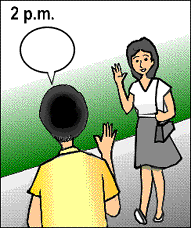 |
|
| 2. It is 9 a.m. A friend of yours is walking toward you. Greet him. | |
![Greetings between friends at 9 a.m. [casual]](../../../../images/pictures/greeting2.gif) |
|
| 3. It is 9 a.m. Your teacher is walking toward you. Greet her. | |
![Greetings between a teacher her student at 9 a.m. [polite]](../../../../images/pictures/greeting3.gif) |
|
| 4. It is 7 p.m. You met your teacher at a restaurant. Greet her. | |
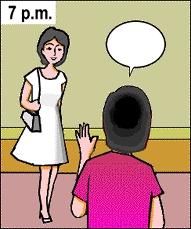 |
|
| 5. It is 9 p.m. at night. After dinner, your guests are leaving. What do you say to them? | |
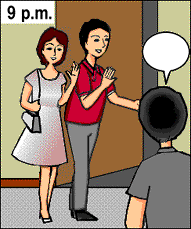 |
|
| 6. You are leaving Yamada-sensei's office. Say goodbye to her politely. | |
 |
|
| 7. You are saying goodbye to your friend. (You will see her again later.) | |
 |
|
| 8. You just brought a cup of coffee to your colleague. As you give it to her, you say... | |
 |
|
| 9. Your colleague has just brought you coffee. You respond... | |
 |
|
| 10. Your friend is giving you a bouquet for your birthday. I'm your friend (A). Please respond as the girl in the picture (B). | |
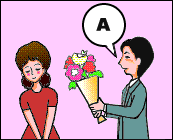 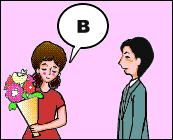 |
A: B: |
| 11. You (A) are on the bullet train, and you would like to buy a coke. You point to it and say to the vendor (B)... | |
  |
A: B: A: |
| 12. You can't reach the book on the top shelf, and a stranger gets it for you. As he (A) hands the book to you, you (B) say... | |
  |
B: A: |
| 13. At the aiport, a stranger's briefcase opens, and he does not appear to notice it. You would like to get his attention. | |
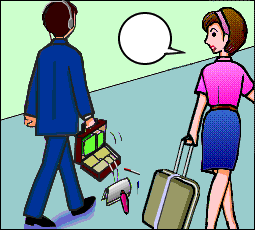  |
|
Conversation #4
| Let's discuss the politeness level of the following expressions. In what contexts does the speaker change his/her politeness level of the speech? |
|
Conversation #5
| Let's practice speaking. Pick two skits from above and converse with your partner. |
A: おねがいします。/onegaishimasu/ |

